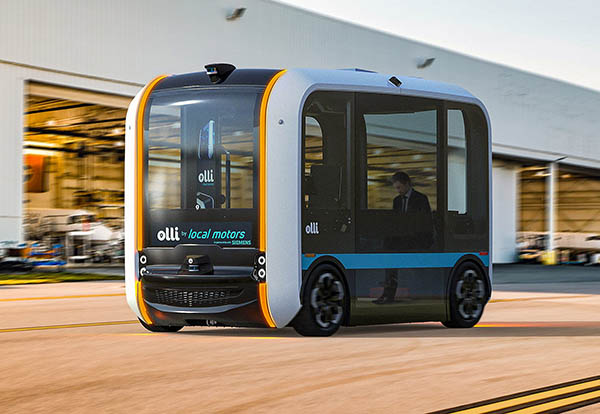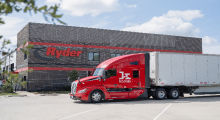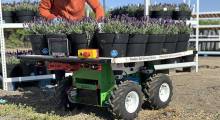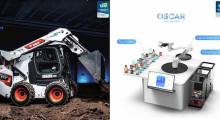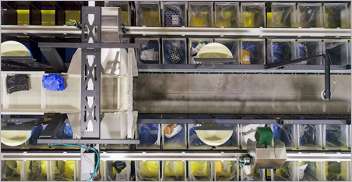While self-driving cars, trucks, and delivery robots continue to make headlines with funding and wider test deployments around the world, the road to autonomy isn't smooth for everyone. Local Motors Inc., which was developing the Olli autonomous shuttle, reportedly shut down today.
Founded in 2007, Local Motors had originally focused on autonomous vehicles for racing, with the Rally Fighter in 2009. It then pivoted to passenger transportation, with a crowdfunding campaign in 2013.
The Chandler, Ariz.-based company said it used a “microfactory” model to manufacture vehicles based on open-source designs. It had claimed to have built the world's first co-created vehicle; the world's first 3D-printed car; and Olli, the world's first co-created, electric autonomous vehicle.
Local Motors started scaling Olli production
Local Motors said that Olli was designed for low-speed applications and used 3D printing to reduce design and manufacturing costs. The company asserted that its digital production would be enable it to introduce new vehicles in months rather than years.
Local Motors had raised more than $15 million in funding in 2020, according to Crunchbase. It also signed a multi-year sales agreement with Velodyne Lidar Inc. and tested its autonomous shuttles in Toronto.
Last year, Local Motors collaborated on computer vision with alwaysAI and signed an orginal equipment manufacturer (OEM) agreement with Perrone Robotics Inc. In September 2021, it announced Vikrant Aggarwal, an industry veteran from Cummins, as its CEO.
“In 2021 alone, Olli vehicles have provided thousands of safe rides in low-speed environments around the globe,” said Local Motors at the time. “The company is focused on scaling production to meet demand and delivered the most vehicles in company history in a single month in August 2021.”
While Local Motors prepared Olli 2.0, a previous model was involved in an accident in December.
Breakdown on the ramp to AV success
As with any advanced technology, many startups will fail before some successfully reach commercialization. The race to fully autonomous vehicles has been expensive and slower than many expected. Other noteworthy shutdowns include lidar provider Quanergy Systems in 2018 and autonomous truck developer Starsky Robotics in 2020.
Also in 2020, Uber sold its Advanced Technologies Group (ATG) to Aurora Innovation, and Amazon acquired Zoox after it laid off 120 contractors.
Last year, Lyft sold its self-driving division to Toyota, and delivery robot firm Nuro acquired self-driving trucking firm Ike. Waymo, which is owned by Google parent Alphabet, and Cruise, which spun out of General Motors, have pumped billions of dollars into self-driving car research and development. Cruise acquired Voyage in March 2021.
Also this week, Magna International acquired the employees and assets of Boston-based Optimus Ride Inc.
Former Local Motors executives expressed optimism, however, about the industry's potential.
“As with most adventures, they must come to an end. Local Motors has closed its doors,” wrote Jeff Hollowell, senior vice president of information technology at Local Motors, on LinkedIn. “It has been an exciting, challenging, and educational experience working with Olli and all the team at Local Motors.”
“I am disheartened to announce that Local Motors will cease to exist as of January 14,” said Chris Stoner, vice president of sales and customer success at Local Motors. “I was only there a few months, but loved every minute of it.”
“The autonomous vehicle space is an exciting emerging market with plenty of opportunity,” he added. “Experiencing first-hand the skill and dedication of the people I worked with, I have no doubt AVs (like Olli) are the future of transportation.”
The global market for autonomous vehicles could experience a compound annual growth rate (CAGR) of 60.6%, growing from 6,100 units in 2020 to 110,100 units by 2026, predicted Research and Markets. Similarly, Market Resarch Guru projected that the market would have a 23.5% CAGR, growing from $35 billion in 2021 to $160.7 billion in 2027.
About the Author
Follow Robotics 24/7 on Linkedin
Article topics
Email Sign Up

